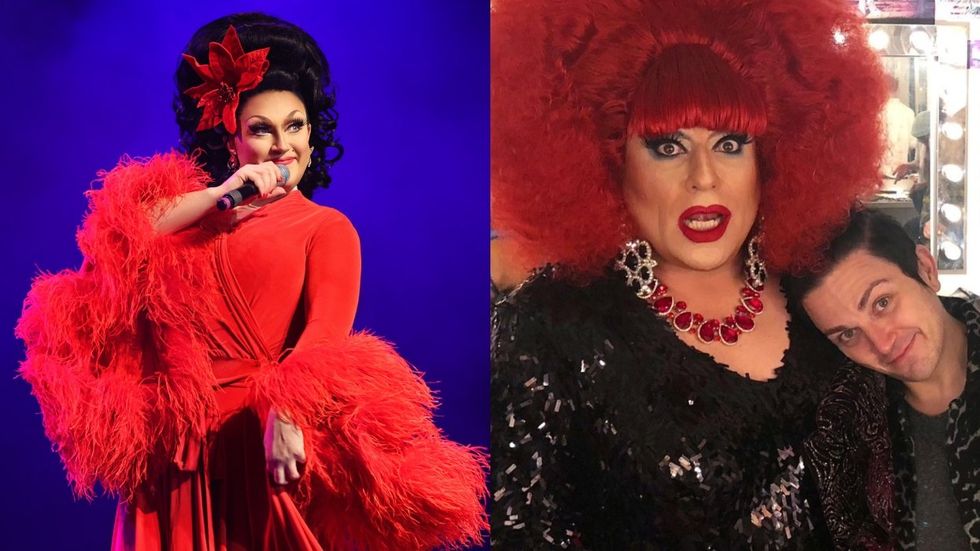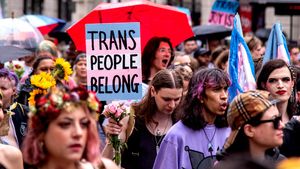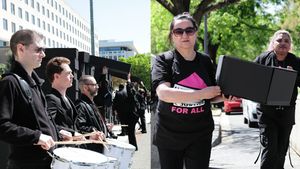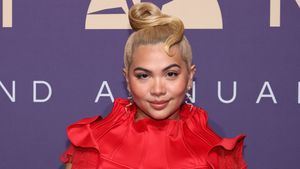My friend Heklina died last month. She was an incredible drag legend from San Francisco and someone I cared for and admired deeply.
The news that we had lost her came as I was struggling to comprehend the litany of anti-LGBTQ+ bills working their way through a majority of states’ legislatures. Bills aimed at trying to push people like us from public view. The timing of her passing and the spate of these bills popping up all over the country sent my mind spiraling, searching for some kind of meaning and guidance. After all, drag queens are the leaders, healers, and storytellers of the LGBTQ+ community.
Heklina, her peers, and the generations of queens before her, The Legends, would know what to do.
I first heard of Heklina, and the community she cultivated on the west coast, the same way we all did before the internet made the world so small: word-of-mouth. I was a young queen looking for my place in the world, and learning about the San Francisco drag scene made me believe in a future beyond my own bleak reality. A future in which my differences wouldn’t be used as ammunition against me. Drag, for me, was never a hobby — it was a calling and my salvation.
Drag is a sacred tradition and the queer community’s link to our ancestors. Drag is a language and a lineage, and I am part of that lineage, connected to the legacy of Heklina and all other queens who came before her. They were the mentors in our community and shepherded us through so many dark periods in our collective history. When queer people could not safely be themselves in public spaces, they would congregate in bars and clubs. And at the center of these spaces were the queens. Singing, dancing, telling dirty jokes, and making everyone feel seen, loved, and always entertained.
Lately, things like dirty-joke-telling seem to be all that people are focused on when it comes to discussions about the “appropriateness” of drag. But dirty jokes in drag performances are much more than provocative humor. They tell the story of queer repression while simultaneously rejecting all the shame we had all been taught to feel. For queer audiences who had been made to feel that their sexuality was shameful, dirty jokes were a way of bringing a taboo topic into the glittery light.
The experience of hearing a joke that pertained to an aspect of queer sexuality and laughing at it together provided validation and catharsis and brought the listener from isolation into community. Dirty jokes have served as a reclamation and reframing of our identities.
The future of drag will reflect the level of widespread visibility and acceptance queer people have won over the course of the last decade. And the memory of the bills targeting the queer community will be folded into the art form.The anti-drag/anti-LGBTQ+ bills that currently threaten to erase our freedom of expression are exactly the reason drag was created. And no matter what happens next with these bills, drag and drag queens will continue to flourish. Even if — especially if — we are pushed into the shadows again. Drag will carry our stories to the next generation.
Every word lip-synched or uttered, every show-stopping dance move or subtle hand gesture, and yes, every dirty joke, will hold this history within it.
 Curtis Brown
Curtis Brown
Heklina’s passing is a tragedy, but her legacy is a gift.
She and many other queens taught me that I have a place in the world and in our history. They taught me not to mistake fabulousness for weakness. That our wrists may be limp in appearance, but they are strong by design. We have hurled bricks to fight hate and written words to spread love. We have carried the weight of our oppression and lifted the community out of despair into joy.
I am proud to help carry this legacy. I am grateful to be part of this community. I am honored to be a thread in the tapestry that weaves our story. And I am blessed that through the next generation of queens and their continued fight for equality and freedom of expression, my ancestors will live on.


































 Curtis Brown
Curtis Brown






















































